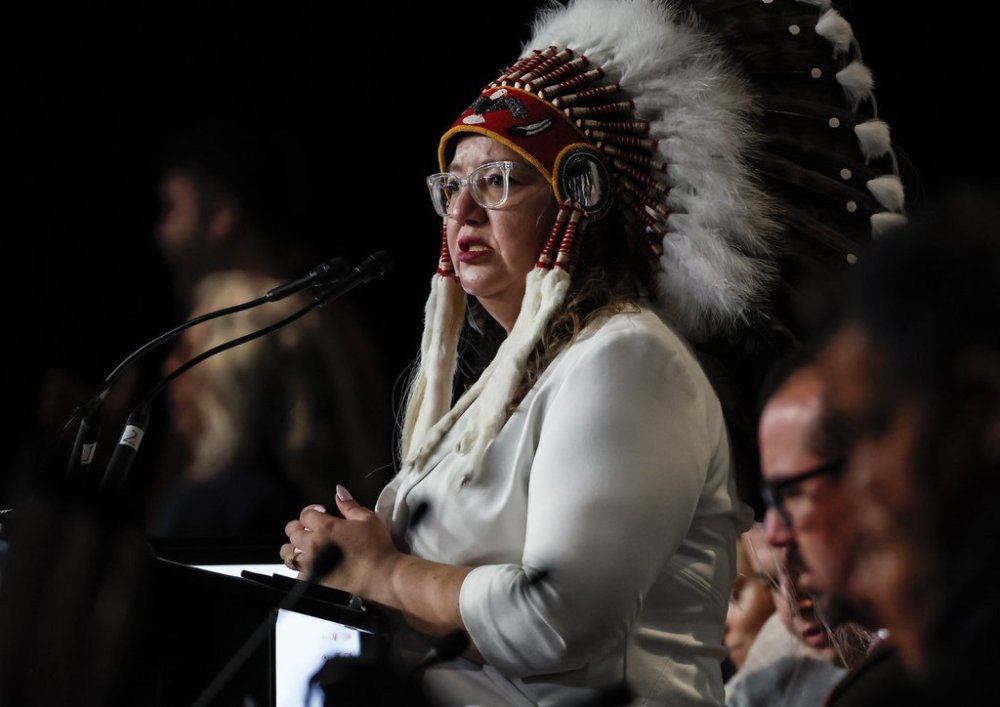National chief calls for federal government to deem First Nations policing essential
Advertisement
Read this article for free:
or
Already have an account? Log in here »
To continue reading, please subscribe:
Monthly Digital Subscription
$1 per week for 24 weeks*
- Enjoy unlimited reading on winnipegfreepress.com
- Read the E-Edition, our digital replica newspaper
- Access News Break, our award-winning app
- Play interactive puzzles
*Billed as $4.00 plus GST every four weeks. After 24 weeks, price increases to the regular rate of $19.00 plus GST every four weeks. Offer available to new and qualified returning subscribers only. Cancel any time.
Monthly Digital Subscription
$4.75/week*
- Enjoy unlimited reading on winnipegfreepress.com
- Read the E-Edition, our digital replica newspaper
- Access News Break, our award-winning app
- Play interactive puzzles
*Billed as $19 plus GST every four weeks. Cancel any time.
To continue reading, please subscribe:
Add Free Press access to your Brandon Sun subscription for only an additional
$1 for the first 4 weeks*
*Your next subscription payment will increase by $1.00 and you will be charged $16.99 plus GST for four weeks. After four weeks, your payment will increase to $23.99 plus GST every four weeks.
Read unlimited articles for free today:
or
Already have an account? Log in here »
OTTAWA – The national chief of the Assembly of First Nations chided the federal government Monday for failing to deliver on its promise to introduce legislation to declare First Nations policing an essential service.
Cindy Woodhouse Nepinak told MPs on the House of Commons Indigenous affairs committee that the failure of governments to equally fund First Nations police services is leaving communities unsafe, with no way to address crime and hold perpetrators accountable.
Former prime minister Justin Trudeau promised his government would bring forward a new First Nations policing law in 2020 but the law has yet to materialize.

“First Nations police forces, they’re not trigger-happy, they don’t kill our people. They’re trying to be grounded in community,” Woodhouse Nepinak said, seated in front of a handful of First Nations police chiefs who gathered for the meeting in Ottawa.
“We know what we need, thanks to years of research, advocacy and engagement…what we need now, of course, is your political will,” she told MPs.
Under Trudeau’s leadership, public safety ministers repeatedly told the Assembly of First Nations the tabling of First Nations policing legislation was imminent, but a bill was never introduced.
The Canadian Press learned through an access-to-information report in 2023 one of the sticking points for both the advocacy organization and Ottawa was whether to recognize policing as an area of First Nations jurisdiction — something the government has done when it comes to child-welfare services.
The federal government blamed the Assembly of First Nations for delays, saying “ongoing challenges” with the advocacy body were limiting “timely progress.”
Woodhouse Nepinak pointed to remarks Prime Minister Mark Carney made during the election campaign, when he said First Nations policing is essential.
“He said he wanted to move to self-administered First Nations policing services and to give control over these services to a range of self-administered policing service agreements and community tripartite agreements,” Woodhouse Nepinak recalled of a meeting between Carney and First Nations chiefs.
“He said we must move quickly as possible to ensure delivery of essential services by First Nations,” she added.
But the initiative is moving slower than First Nations leaders would like. That includes Ontario Regional Chief Abram Benedict, who told the committee First Nations communities, especially those in the north, are being victimized by organized crime due to the lack of a constant police presence able to enforce the law.
Woodhouse Nepinak also pointed MPs to the call from chiefs for a federal inquiry into systemic racism in policing, following a string of police-related deaths last year that has gone unanswered.
This report by The Canadian Press was first published Oct. 20, 2025.

